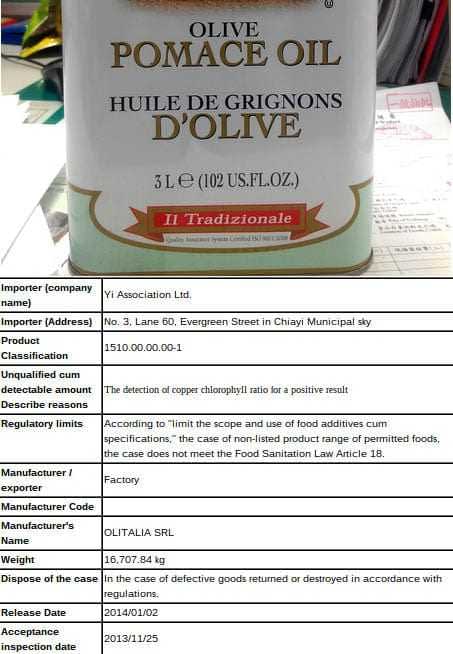Olitalia is the latest exporter to have its olive pomace oil rejected by Taiwan for allegedly containing the green colorant copper chlorophyll.
Amid international concerns about the certainty of its testing, Taiwan’s Food and Drug Administration (TFDA) has announced that a nearly 17-ton shipment from the Italian supplier must be either destroyed or returned because the compound was detected in it.

Olitalia, which claims to be the olive oil brand “most distributed in the world”, is the island’s number one olive pomace oil supplier.
Fellow supplier Vidoria, a Spanish company, has 8 metric tons of olive pomace oil stranded at a Taiwan port after also testing positive.
Taiwan is understood to be taking samples from all such shipments in the wake of a wider edible oil scandal in Taiwan which has seen various companies fined, and on December 16 saw the head of a leading Taiwanese cooking oil company — said to have adulterated olive oil with cheaper cottonseed oil and copper chlorophyllin — sentenced to 16 years jail for fraud and mislabeling.
Expert says compound can occur naturally in olive pomace oil and grapeseed oil
Synthetic copper chlorophyllin is permitted in certain foods but not in vegetable oils. Adding it to cheaper oils — called “greening up” — is a trick sometimes used to try to pass them off as olive oil, and especially as extra virgin olive oil.
But as reported last week by Olive Oil Times, oil expert Wenceslao Moreda, from Spain’s Fats and Oils Institute in Seville, is among those who say that under existing test methods, a positive result for the compound in the case of olive pomace oil or grapeseed oil “may correspond to that formed naturally…and not to the addition of the colorant…”
It is understood that a report by Moreda on the subject has been sent to Taiwan by Spanish authorities.
Italian exporters ask for intervention in Taiwan
And in a letter last month to the Italian Institute for Foreign Trade (ICE) in Taipei, ASSITOL, the Association of the Italian Oil Industry, which represents packagers of olive oil and seed oils, said its tests showed that “a minimal presence of copper chlorophyll” can be “generated naturally” and at levels much lower than what would be needed to color an oil.
ASSITOL asked the institute to liaise with the TFDA to seek the suspension of any measures against the import and distribution of Italian oils in Taiwan.
The TDFA and Olitalia have yet to reply to requests for comment.
Another industry member who asked not to be named said he felt Taiwan was using foreign suppliers as a scapegoat to cover up irregularities in its domestic edible oil market.







